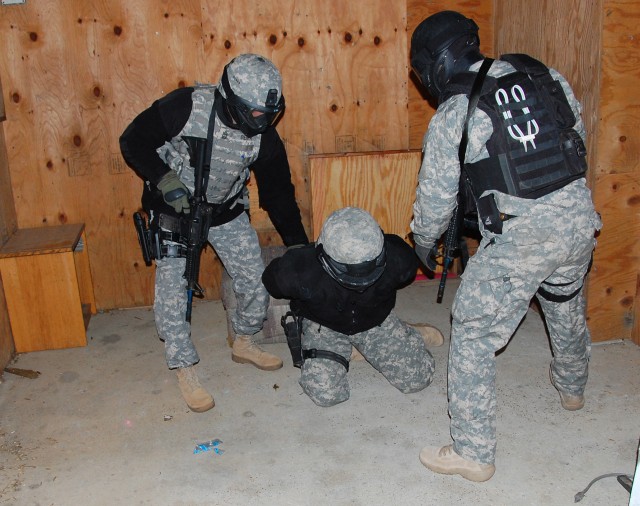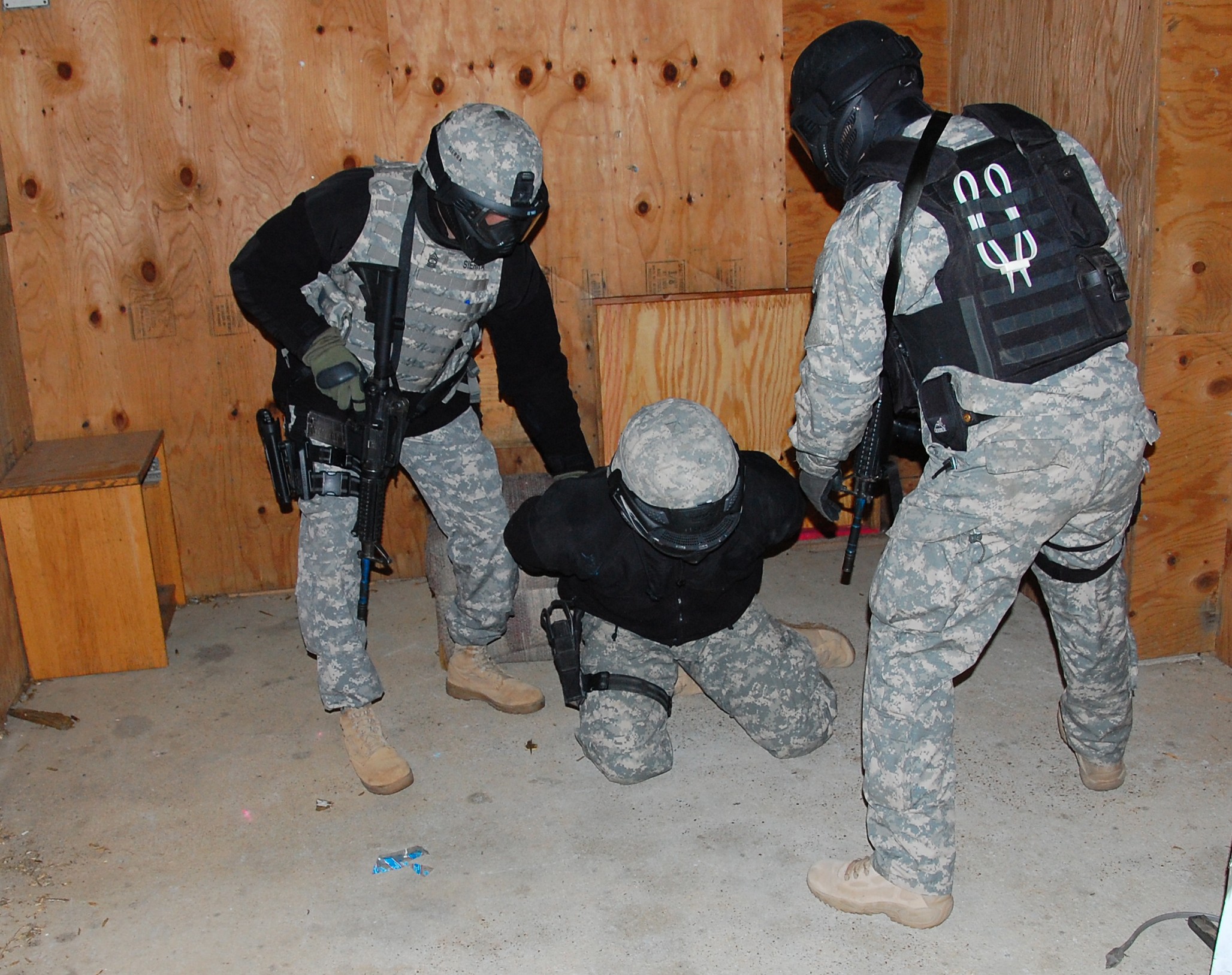A team of Army military policemen and Department of the Army police officers silently approaches a two-story building. Intelligence reports indicate a "person of interest" is inside who needs to be removed for interrogation. The police officers' goal is to take the person into custody quickly and quietly without collateral damage to property or life.
The team waits in place outside of the door to the building. Sweat beads their foreheads in spite of the cool weather. They struggle to stay still so as not to give away their position.
Finally, the door opens and the suspect exits the building. Like a well-oiled machine, the team leaps into action, takes down their target, handcuffs him and removes him from the area. The operation takes less than a minute.
This scenario - and others like it - played repeatedly Feb. 2-6 as military police and DA police officers from Fort Polk conducted Special Reaction Team training at the Shugart-Gordon complex.
First Lt. Nathaniel Shuhart, Headquarters and Headquarters Detachment, 519th Military Police Battalion, 1st Maneuver Enhancement Brigade, said the SRT training is twofold.
"First, we want to provide the ultimate protection for Fort Polk," Shuhart said. "Also, we want to form a military SRT in addition to the one provided by the DA police."
A two-theater war along with stateside duties has the MP Corps stretched thin, Shuhart said.
"As a result, we had kind of gotten away from the law enforcement aspect of our job," he said. "I think now we're starting to work our way back into police work and become more active in law enforcement. This type of training reinforces that."
The instructors for the SRT training teach at the Army's MP School at Fort Leonard Wood, Mo.
"Having instructors from the MP school ensures we receive the most up-to-date training that is in line with what is being taught Army-wide," Shuhart said. "That's important in the event you wind up working with MPs from other units and posts."
While the training's goal is to beef up on-post protection and foster a closer working relationship with DA police, there is another benefit, Shuhart said.
"This will benefit our MPs when they go down range and have to go into buildings in Iraq or Afghanistan," he said. "They can take this training and pass it along to their fellow Soldiers. Hopefully, it will help protect them when they deploy."
Today's Soldiers fight a much different battle than Soldiers in Vietnam or other recent conflicts, Shuhart said.
"Iraq and Afghanistan are urban environments, going building to building," he said. "This training helps you prepare for that type of warfare. It gives you confidence that should the situation arise, you have the skills to successfully complete the mission."
Shuhart said most of the MPs who trained at Shugart-Gordon were with the 209th MP Co.
"They are headed down range shortly," he said. "This training was designed for them so they could go back and teach their fellow Soldiers the tactics that they learned."
Sgt. Bradley McNelly, 209th MP Co, said the training he and his fellow MPs received at Shugart-Gordon was important.
"These types of scenarios are not done often enough during our regular duty days to become second nature," he said. "This training allows you to develop team cohesion so you know exactly what your teammates are going to do. Everyone is on the same page so that when you enter a house you know where everybody is going to go and how to back them up."
McNelly said the training works just as well on post or for deployment.
"The training also allows us to mix up our teams and accomplish the mission," he said. "For example, three members of our team could go with three members of another team, enter a building and work together just fine."
Spc. Jay Youngblood, 209th MP Co, said the exercises helped him prepare for future scenarios.
"Whether you are on post or deployed, you need to be prepared to send a team in to clear a building or a room," he said. "If that situation arises, we've got the training to back it up, go in, do our thing and come out safely."
Spc. Kevin Gilgannon, 209th MP Co, said the last time most of the MPs received this type of training was early in their military careers.
"This training is important when we go down range and have to clear buildings," he said. "Most of us had this in basic training and that was the last time we covered it. Learning it now, you get more in-depth with where you're supposed to go and what you're supposed to do. It helps us save each other's lives."
The 519th MP Bn hopes to host the SRT training on a semi-annual basis, Shuhart said.
"We want to create a military SRT team to complement the DA Police team," he said. "Our plan is to have a 10-person team with an NCOIC and an OIC. We could rotate who is on call and that would take a little pressure off of the team members because when you're on call, you have to be ready to respond within two hours."


Social Sharing